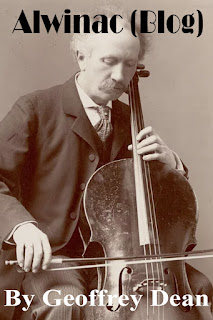 |
| [Click on image to go directly to the Alwinac’s home page] |
“If you would hear the very soul tell all its deepest, most inner feeling,
if you would listen to language as from another world and from some matured spirit in a more exalted and perfect state than here below,
go to hear Knoop.
You will feel as if he were drawing out of you your very soul.”
if you would listen to language as from another world and from some matured spirit in a more exalted and perfect state than here below,
go to hear Knoop.
You will feel as if he were drawing out of you your very soul.”
C. P. Cranch to Miss Julia Myers, April 11, 1842
in The Life and Letters of Christopher Pearse Cranch
 Johann Georg Knoop (sometimes spelled Knop, 1797-1849) was a celebrated German cellist who spent the last decade of his life as one of the most highly regarded instrumental performers in the United States. Because his name was commonly abbreviated as G. Knoop, he is often confused with his younger brother Gustav Knoop (1805-?), also a cellist. Georg was born in Gottingen, may have studied with Romberg, and made his concert debut at the age of eight. in 1816 he succeeded Dotzauer’s teacher Johann Jakob Kriegk as first cellist in the Meiningen court orchestra. His first wife was Kriegk’s daughter Louise, and their cellist son Huldreich (1820-1898) played alongside Carl Ludwig Dotzauer in Spohr’s orchestra in Cassel. Georg and Gustav had six other siblings, including the Basel music publisher Ernest Knoop and Wilhelm Knoop, a violinist in the Meiningen orchestra. Their father Conrad Knoop was a Gottingen music dealer and teacher. (letter from Conrad Knop to Louis Spohr, March 28, 1822)
Johann Georg Knoop (sometimes spelled Knop, 1797-1849) was a celebrated German cellist who spent the last decade of his life as one of the most highly regarded instrumental performers in the United States. Because his name was commonly abbreviated as G. Knoop, he is often confused with his younger brother Gustav Knoop (1805-?), also a cellist. Georg was born in Gottingen, may have studied with Romberg, and made his concert debut at the age of eight. in 1816 he succeeded Dotzauer’s teacher Johann Jakob Kriegk as first cellist in the Meiningen court orchestra. His first wife was Kriegk’s daughter Louise, and their cellist son Huldreich (1820-1898) played alongside Carl Ludwig Dotzauer in Spohr’s orchestra in Cassel. Georg and Gustav had six other siblings, including the Basel music publisher Ernest Knoop and Wilhelm Knoop, a violinist in the Meiningen orchestra. Their father Conrad Knoop was a Gottingen music dealer and teacher. (letter from Conrad Knop to Louis Spohr, March 28, 1822)In addition to his Meiningen duties, Georg Knoop toured as a soloist in Europe, performing to acclaim in Paris and London from 1833. He seems to have made regular appearances in England for several years, performing concertos at the Philharmonic concerts and earning the epithet “violoncellist to her Majesty.” (London Morning Post, July 14, 1835, p. 3) In the spring of 1835 Knoop was in direct competition with other leading cellists of the day, performing solos on the same concerts as A. F. Servais and Carl Schuberth. Of the Knoop/Schuberth play-off, the Morning Post wrote, “…both the violoncellists displayed great talent, particularly Mr. Knoop, in a Swiss divertimento, in which he introduced the harmonics with excellent effect.” (May 30, 1835, p. 3) Georg’s solos on another London concert were described as “both beautiful in style and extraordinary in execution.” Both Knoop and Servais were found “wanting that body of tone which no one except [London cellist Robert] Lindley has yet acquired, and which is necessary to fill a large space.” (Court Magazine and Belle Assemblee, October, 1835, p. 176) Knoop himself confided to Spohr that “My stay in London was not particularly pleasant, as the artists there placed many obstacles in my way….
_______________
Read on…on the Alwinac website itself….
| Copyright © 2023 by Geoffrey Dean |
Geoffrey, the depth and thoroughness of your Alwinac posts are simply astounding. Have you seen any evidence yet that music-history scholars are beginning to take note and starting to mine the Alwinac for their own researches? Have you been invited anywhere yet to go deliver a lecture? Maybe there'll be a commencement-speaker invitation....
ReplyDelete